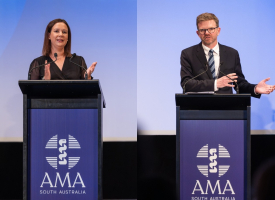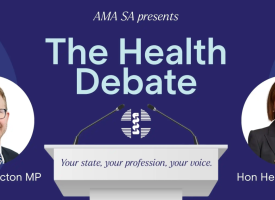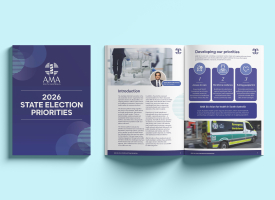Stronger, strictly enforced regulation needed on vaping

The Australian Medical Association has called for stronger, strictly enforced regulations on vaping, telling the federal government Australia is at risk of losing the public health battle on vaping if strong action isn’t taken.
AMA President Professor Stephen Robson said Australia had been a world-leader on tobacco and nicotine control for decades but has dropped the ball with vaping.
“Vaping is not harmless, it is not safe, it is not part of tobacco control,” Professor Robson said.
In its submission to the Therapeutic Goods Administration (TGA) consultation on potential reforms to the regulation of nicotine vaping products (NVPs) the AMA said it had repeatedly advocated for regulations to be changed to limit access to NVPs (which have a poor evidence base as a smoking cessation tool) by banning the personal importation of NVPs and reducing the allowed concentration of nicotine.
“The Personal Importation Scheme bypasses many of the product standards outlined in regulations, such as labelling, packaging, and record-keeping requirements and it’s incredibly challenging to enforce,” Professor Robson said.
While the TGA consultation focuses primarily on NVPs, the AMA supports introducing controls on the importation of all vaping products through customs.
“This would begin to address the public health challenge of tackling both non-nicotine vapes and nicotine products. Nicotine and non-nicotine vaping products are regulated differently which complicates and hinders progress on this issue,” Professor Robson said.
“Vaping products are a gateway to smoking for young people and there are significant risks from vaping that warrant much stronger regulation. For example, we know many products marketed as not containing nicotine have been found to contain nicotine and products have also been found to contain prohibited chemicals that can cause serious harm, like vitamin E acetate and diacetyl, which can cause serious damage to the lungs.”
Professor Robson said the AMA wants improved regulation to curb the proliferation of recreational non-nicotine vaping products, including implementing similar regulation to tobacco products, such as health warnings, better labelling, plain packaging, and tobacco licences.
“We also need a targeted federal response to monitor and act on illegal advertising and promotion of e-cigarettes —particularly online and on social media — and improved enforcement of existing state and territory regulation to help block illegal vape sales both online and through shopfronts.”
The AMA’s submission supports minimum safety and quality standards and pre-market assessment of NVPs and registration of NVPs on the Australian Register of Therapeutic Goods.
“Patients with a prescription for an NVP should be able to have the confidence that they are using a product that has passed the safety, quality, and efficacy assessments of the TGA, instead of purchasing an overseas product that hasn’t had to meet good quality and safety standards,” Professor Robson said.
The AMA has also proposed reducing the concentration limit allowed under regulations from 100mg/ml to 20mg/ml and introducing limits on the flavours and volume of nicotine that can be prescribed or ordered.
“We would also like to see the government work with state and territory governments to add NVPs to real time prescription monitoring programs and the MBS telehealth smoking cessation items amended so only a patient’s usual doctor can prescribe NVPs to help people stop smoking,” Professor Robson said.



